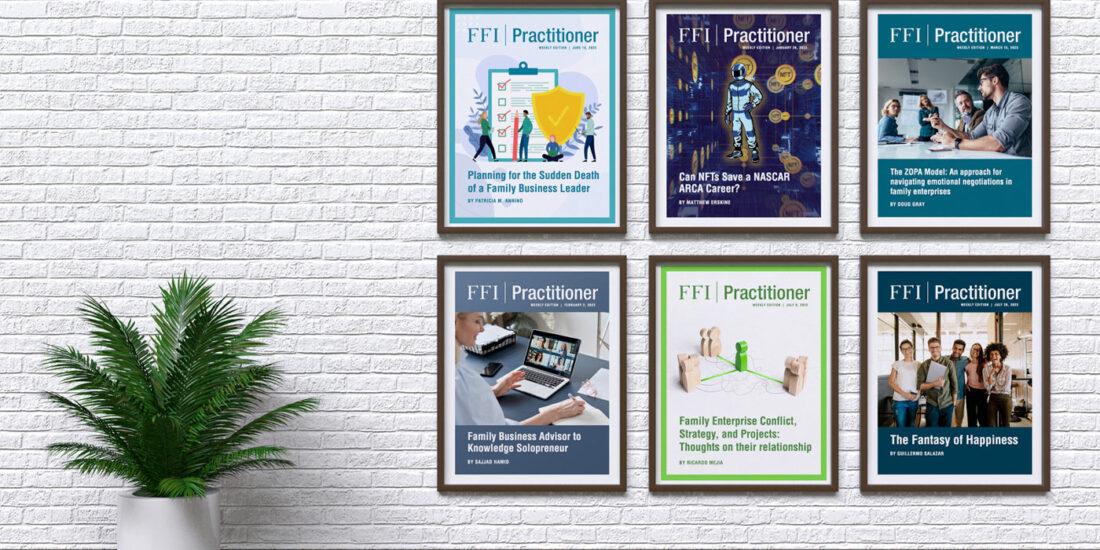Research Applied: FBR Summaries for The Practitioner
The Practitioner brings you Executive Summaries from FBR Assistant Editor Karen Vinton, covering a range of topics that are true north on a practitioner’s professional compass. Karen recaps three articles from the December 2012 FBR, ranging from 1) the need for emotional ownership among the next generation to 2) family foundation governance issues and 3) the relationship between job stress and job turnover in the family firm. Karen’s editorial viewpoint on each article as well as the articles themselves can only enhance your work with clients. Enjoy these summaries and articles and don’t forget to share them friends and colleagues.
SUMMARY 1: Emotional Ownership: The Next Generation’s Relationship with the Family Firm
Asa Björnberg and Nigel Nicholoson
This study introduces readers to the concept of emotional ownership (EO) and the impact it has on the next generation’s (NxG) relationship with the family firm. EO is defined as a sense of closeness and belonging to the family business – what psychologists call ‘attachment.’ In-depth interviews with 56 next generation family members from 8 family enterprises and an on-line survey of 960 next generation family members indicates that some degree of emotional ownership is a necessary but not sufficient condition for the continuation of a family firm.
Some of the major findings of this study are as follows:
- Family members who feel no attachment or identification with the enterprise are unlikely to persist or engage in the enterprise regardless of their ownership or management status in it.
- Family climate was found to influence the level of EO the NxG family members feel towards their business. Family climate can be measured using Björnberg and Nicholson’s Family Climate Scale.
- Higher levels of family governance comprehensiveness were found to influence the level of EO the NxG family members feel towards their business. Family governance comprehensiveness was indicated by the formal procedures and rules regarding – (i) how next generation members join the business; (ii) sale of shares or transfer of ownership; (iii) family values and/or family strategy; and (iv) a formal family council.
- In order to experience emotional ownership with the business, NxG family members need a structured, organized and fair process approach to engagement of family members in the business. These factors are equally important for NxG members regardless of whether they work or not in their family enterprise.
These findings have significant importance for practitioners and family business owners. These results emphasize the importance of reviewing the family climate in order to ensure that junior members enjoy a stable base to build their EO for the enterprise. The results also emphasize the importance of developing a family governance system based on a fair process before a need or conflict arises.
If you’re interested in reading more about EO, you can find additional information in a report here.
SUMMARY 2: A Governance-Based Typology of Family Foundations: The Effect of Generation Stage and Governance Structure on Family Philanthropic Activities
Razvan Lungeanu and John L. Ward
Family foundations, that is, foundations that operate with hands-on involvement of an active donor and/or donor family, have grown over time. According to the National Center of Family Philanthropy, in 2005, 40% of independent foundations were family foundations. By 2007, 50% of all 40,200 independent foundations were family foundations. In addition, in 2007, family foundations made $18.5 billion in grants which represents 56% of all independent grant making in that year.
This study examined 200 of the largest independent foundations in the United States, of which 111 (55.5%) were family foundations. Of these 111 US family foundations, 62% are closely controlled by the founding family and 47% have the founder on the board of directors. The study found the following key findings:
- Family foundations are more focused in their grantmaking than non-family foundations, and across both types of foundations, those with larger board sizes tend to be more diversified in their grantmaking.
- Younger family foundations and family foundations with a lower number of outsiders on the board were more focused in their grantmaking.
- As the board size increases, the gap in degree of diversification between family and non-family foundations decreases since family foundations get more diversified in their grantmaking activities.
The interdependencies that the study identified between board evolution, family dominance over the board, and grantmaking diversification represent great challenges for family foundations. Families need to be aware of the potential changes that might occur in the grantmaking activities of their foundations as boards evolve and grow. Practitioners can help guide their clients as these changes occur. Both practioners and family foundations should find reading the Implications for Practitioners section of this paper very interesting.
SUMMARY 3: How to Increase Job Satisfaction and Reduce Turnover Intentions in the Family Firm: The Family-Business Embeddedness Perspective
Dmitry Khanin, Ofir Turel and Raj V. Mahto
A concern of all family businesses is how to keep family employees satisfied with their jobs and reduce needless turnover. The authors of this study examined what is currently known about job satisfaction and turnover intentions and developed a model which proposed that family-business embeddedness, superior job alternatives and work centrality contribute to job satisfaction which leads to reduced turnover intentions. This study surveyed 111 family employees of 70 family firms in the western United States.
Family-business embeddedness is defined as the confluence of values and objectives stemming from family, business and symbolic contexts within the family firm. In this study, family-business embeddedness positively predicted job satisfaction and also reduced the desire of family employees to possibly leave the family business.
Work centrality recognizes work as a dominant value in an employee’s value system, instead of merely thinking of work as a way to make a living. Higher levels of work centrality served to increase family employees’ sense of job satisfaction and reduced their desire to leave the family firm.
Superior job alternatives outside the family business refer to things such as greater salary, faster salary increases, better overall compensation, and better opportunities in different industries. It was found that the presence of superior job alternatives reduced family employees’ job satisfaction, thereby increasing their intention to leave the family firm.
These results provide key insights for practitioners and family business owners and managers. The study emphasizes the importance of considering job satisfaction if one wants to retain key family employees (or all employees). It also highlights the importance of being aware of compensation practices and career opportunities outside of the family business. The importance of family-business embeddedness on job satisfaction provides further proof of the impact both family and business values can have on job satisfaction and, ultimately, turnover intentions. A podcast interview with the author which further explores this fascinating topic can be found here.
About the Contributor
 Karen L. VintonPh.D. is a 1999 Barbara Hollander Award winner and Professor Emeritus of Business at the College of Business at Montana State University, where she founded the University’s Family Business Program. An FFI Fellow, she has served on its Board of Directors and also chaired the Body of Knowledge committee. From 1997 through 2011, Vinton served on the editorial board of Family Business Review, and is the current assistant editor. Before retiring, Vinton served as director for her own family’s business (negotiating its eventual sale) and had her own family business consulting practice, Vinton Consulting Services. Karen can be reached at klvinton700@gmail.com.
Karen L. VintonPh.D. is a 1999 Barbara Hollander Award winner and Professor Emeritus of Business at the College of Business at Montana State University, where she founded the University’s Family Business Program. An FFI Fellow, she has served on its Board of Directors and also chaired the Body of Knowledge committee. From 1997 through 2011, Vinton served on the editorial board of Family Business Review, and is the current assistant editor. Before retiring, Vinton served as director for her own family’s business (negotiating its eventual sale) and had her own family business consulting practice, Vinton Consulting Services. Karen can be reached at klvinton700@gmail.com.
Be sure to look for The Practitioner: Wednesday Edition each week in your inbox and online.
Add your voice to the discussion by using the comment space, share with others via our social sharing buttons, subscribe to the blog, or become a guest blogger or contributor.
Yours in Practice,
The Practitioner





